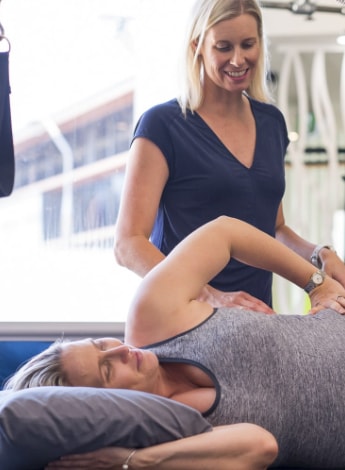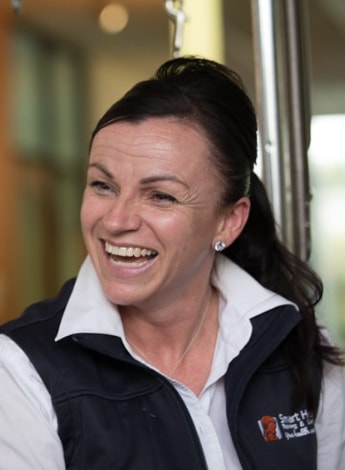
Preparing for the new rules

Last year the federal government made the decision to make certain natural therapies ineligible for private health insurance rebates, coming into effect on 1 April. Included in this banner is Pilates. Three APA members explain how they are preparing for the changes. Skye Mitchell reports.
Physiotherapy practice is recognised by all parties as high-value, evidence-based care and should be underpinned by individualised assessment, treatment and follow up, and backed by thorough notes. Through the APA’s advocacy, the Department of Health has accepted that an insurer may lawfully pay benefits if a physiotherapist provides services to a patient within the accepted scope of clinical practice, and uses exercises or techniques drawn from Pilates as part of that patient’s treatment.
This means that as long as your physiotherapy practice is performed within the scope of physiotherapy, it does not need to change.
The Department of Health does not differentiate between Pilates and clinical Pilates; therefore, rebates will not be paid for clinical Pilates and clinical Pilates should not be referenced in your clinical notes.
The opportunity to change the name of physiotherapy-led Pilates sessions presents a great opportunity to market the profession and its evidence-based effectiveness even further. The APA encourages members to choose a name that makes sense to them because rebranding Pilates with another universal term might mean that it becomes problematic with private health insurers for the same reasons within a couple of years.
The APA envisage that the changes will require some good communication between clinicians and consumers to ensure consumers understand them.
Staying physio focused
Holly Brasher from Square One in New South Wales uses Pilates for exercise so that her patients can achieve good outcomes long- term. ‘Pilates group classes are a mode of delivery for us to provide evidence-based exercise programs to our patients. We all know how poor patient compliance is with completing home exercise programs and without exercise, we can’t gain a lot of those outcomes that we require. So having a Pilates-based program is about having something in-house we can refer our patients and help us achieve what we need to with our client,’ she says.

There are a few different exercise programs under the Pilates banner at Square One: one-on-one private sessions with a physiotherapist, one physiotherapist to two patients, and the main group format, being clinical equipment classes (where three patients complete their individualised program under the supervisions and guidance of a physiotherapist).
Holly says, ‘in order to ensure we comply with the new private health reform coming, we don’t need to change how we use Pilates in the clinic because the way we run it is physio-focused. Pilates at Square One is based on individualised assessments, targeted at patient impairments and goals and progressed accordingly. The group classes are not just limited to using Pilates’ exercises—we use the group format to deliver whatever exercise that patient requires. This absolutely includes traditional physio rehab exercises and gym-based strength work. Square One also offers exercise-based sessions that are purely based around strength and conditioning principles for those who prefer to achieve their outcomes in a gym-based environment or require increased loading [that can’t be provided by Pilates-based exercises] to achieve this.’
‘In order to ensure we comply with the new private health reform coming, we don’t need to change how we use Pilates in the clinic because the way we run it is physio focused.’
Holly says that the private health insurance natural therapy reform will improve Pilates-based physiotherapy through a renewed focus on assessment, monitoring and outcome measures. ‘Pilates is a way of branding for us—to get our patients exercising so they can achieve their goals. It doesn’t mean clients just do Pilates. We’re not changing the way we run the classes because the way we run the classes is appropriate as physios. However, we are using this opportunity to review our internal processes to make sure that we’re all practising as physios and not as Pilates’ instructors. This includes our assessment procedure, our note taking and ensuring we have regular reviews and better outcome measures,’ she says.
Holly and the team at Square One started making changes on 1 January. They have removed the word Pilates from all of their internal forms and are in the process of removing it from timetables. They have also changed the way they document what exercises patients do in the groups. ‘Like many practices, we have used a combination of an exercise tick list and SOAP notes. We’ve changed our forms so that they are based solely around the impairments/focus/goals for each individual attending. Each time we see our patients we make sure we are working solely on their goals and not just delivering and progressing Pilates exercises. We are tightening up our SOAP notes and making sure every patient has at least one well-defined outcome measure to track their progress,’ she says.
Holly believes that, overall, these changes will force private practitioners to look at the service they are delivering and improve it for the benefit of patients by narrowing the focus to what the physiotherapist should be working on with their patients in each session. ‘It should be about goals and not fancy exercises. Many practices will need to make sure they are practising using clinical-reasoning frameworks as a physio and not Pilates instructors. There are many ways to achieve an outcome and many exercises that will get you there. There will be several months of some painful administration but we will get there. I am yet to figure out how to market to new patients wanting to do Pilates … that’s my next task.’
APA Sports and Exercise Physiotherapist Holly Brasher graduated from Sydney University in 2000, and has since completed a master’s in sports physiotherapy through La Trobe University.
An inside perspective
Teaching Pilates has been an 18-year focus for Jennifer Guest and a prominent physiotherapy tool for her Smart Health Training and Services clinic in South Australia. The Smart Health clinic physical set-up includes a large centre area for exercise and Pilates with the treatment rooms situated around it. That way, if the client needs some form of exercise they can be referred ‘out to the floor’ to one of six physiotherapists who are trained in exercise physiology or Pilates.

Jenni has been on the board of the Pilates Alliance of Australasia (PAA) for 10 years and was president of that board for the last five, finishing her term in November 2018. ‘Despite being a physiotherapist and doing clinical practice for 38 hours a week, I’ve had this entire side life that was very involved with Pilates,’ she says. ‘I’ve been involved with the Pilates industry and teacher training in Australia for about the last 16 years, so I’ve always had Pilates on my radar.’ Because of this Jenni has worn two very strong hats: physiotherapist and private practice owner, and senior Pilates educator. She says that she has been ready for the changes to private health insurance rebates for Pilates following the initial Department of Health announcement.
‘... we’ve always treated Pilates as a physiotherapy tool as opposed to a fitness program.’
Jenni has had opportunities to watch how the industry has changed and developed over the last 18 years, and the introduction and growth of commercialised Pilates in Australia. ‘I was one of the earlier physios in Australia using Pilates as an exercise tool and I was audited back in the early ‘90s, which was good because it forced me to make sure that all the clinic’s Pilates-related actions have been put into our policy and procedure manual,’ she says. ‘At my clinic, specifically, all patients have an initial assessment, and a follow up at the four or six-week mark depending on how long they’ve been coming. At my clinic, absolutely every aspect of Pilates’ treatment is well-documented. I make sure that my staff and I write a case note, even if it’s little, for anything related to Pilates because we’ve always treated Pilates as a physiotherapy tool as opposed to a fitness program,’ Jenni says.
‘I have recently removed the term Pilates from our business brand and literature. I was at an advantage because of the information I had been provided with early last year. I knew that the changes were pending and I was able to consider these changes, our business model and how our Pilates relates to our physiotherapy skills. I was able to prepare my website people, my business partners and business director.’
Jenni has also taken steps to make sure clinical notes are reflecting the treatment provided and they will still use the same service descriptors and item codes. Jenni says ‘we were running only three mat classes a week, but we are actually phasing them out over the coming weeks and removing the Pilates mat classes, because in my opinion they are becoming a little bit too fitness-based, rather than physiotherapy-based.’
Jenni has been having conversations with her clients for over six months. She has been communicating with them verbally and made sure they are aware of what is going to happen after 1 April. ‘I have explained to my patients that “we have no ability to change this but try not to be too concerned because it’s not going to affect the way we treat you, or what you see at Smart Health”. The only people [to whom] I’ve had to explain that it is going to change, are those few people who attend those three mat classes.’
Despite Jenni’s involvement in Pilates training and teaching, she has always been fighting for physiotherapy, which is why she has been preparing for a change like this for the past year. Jenni says, ‘Yes it did happen—the government made a change and now the insurance companies are making a change along with the views of the government. I have always used Pilates as a physiotherapy treatment tool. That is why we can be safe and privileged to say that the insurance changes are only going to affect us minimally at Smart Health.’
Jennifer Guest, APAM, holds membership with the Pilates Alliance Australasia and sits on the South Australian Branch Council of the APA. She is a Director of Smart Health Training and Services, a private allied health/medical centre which works strongly on the philosophy for a collaborative care model.
Clearly defined treatment tools
Rachel Combe is the director of Physio Pilates Proactive (PPP), a clinic with a strong focus on Pilates across three locations in South Australia. Rachel says ‘the practice has 14 physios who all have Polestar Pilates rehabilitation training, so it’s a massive part of our business—it forms at least 60 per cent of what we do. We have plenty of diversity, from high-level neuro and orthopaedics prehab and rehab, to your typical musculoskeletal conditions like low back pain, shoulder problems or hip problems.’
Rachel has clearly defined that there are two streams of Pilates sessions offered at the clinic: a rehabilitation stream and a preventative stream. ‘Mat classes and reformer classes are more about prevention of injuries and maintaining physical health. We see many patients who have initially gone through the active physio rehabilitation stream then filter into mat and reformer classes as a way of continually dealing with their chronic issues and keeping them under control. All classes are run by physiotherapists which makes the practice consistently focused on safety, education and quality technique,’ Rachel says.
‘Mat classes and reformer classes are more about prevention of injuries and maintaining physical health.’
For Physio Pilates Proactive’s rehabilitation patients to claim after the 1 April changes, Rachel will be changing the name from Pilates’ rehabilitation sessions to physiotherapy individual rehabilitation sessions, which Rachel says should be an easy transition. ‘The sessions fulfil the legislation criteria because patients are assessed regularly, their outcomes and treatment goals are regularly monitored, and each program comprises of many physio-based exercises.

‘As for our preventative stream, which includes mat and reformer classes, we thought long and hard about it. I know a lot of clinics are changing their class names to avoid using the name Pilates, but we feel so proud about what we do from a Pilates perspective. We have all done a huge amount of Pilates training and feel that changing the name of these classes would dilute the product. As a result of this decision clients won’t be able to claim our Pilates mat and reformer classes from April 1.’ Rachel’s personal belief is that the practice might lose around 20 per cent of its regulars, but then 10 per cent may return when they notice their aches and pains are returning. ‘I am hoping we have done enough with our branding over the years and have sufficient client loyalty that our numbers will remain relatively consistent.’
Rachel and her team will ensure patients who attend group rehabilitation sessions book a reassessment before 1 April to establish updated treatment goals, which are reassessed every three months. Some of these clients will fall more into the preventative stream after an initial program of rehabilitation and, therefore, be unable to claim. Notes for every attendance are written in the SOAP format documenting any changes and improvements.
As for the business name, according to the legislation, the clinic can keep Pilates. Rachel says the most important aim for her physiotherapists is to remain dedicated to keeping people healthy, well, and out of pain where possible. ‘Pilates is a fantastic way to achieve this. We would rather risk losing a few clients initially with them not being able to claim for some of our services, but then move on from there using our physio-led Pilates classes as a big point of difference.’
Rachel Combe, APAM, qualified as a physiotherapist from the University of South Australia in 1997. After having worked in Outback Australia for Broken Hill Hospital and the Royal Flying Doctors Service, she moved to Cambridge, UK where she gained her accreditation as a Pilates-trained practitioner.
Click here to find out more about Pilates funding changes, including what you need to know as a private practioner, or email policy@australian.physio.
© Copyright 2024 by Australian Physiotherapy Association. All rights reserved.





